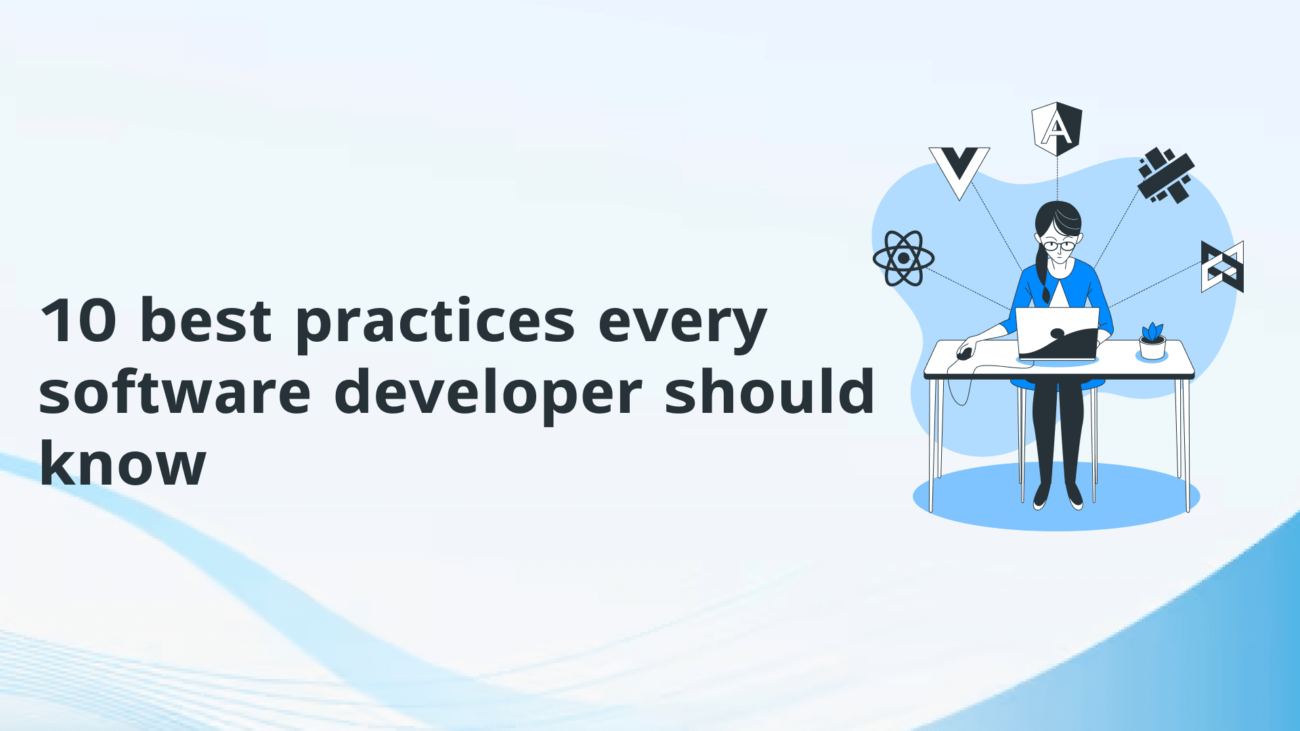In today’s tech world being a software developer is more than just writing code. Whether you’re an experienced engineer or just starting out, following best practices is key to delivering high quality, maintainable software. These practices improve your code and better collaboration and long term project success.
In this post we’ll look at 10 best practices every software developer should follow to boost productivity, code quality and stay competitive in a constantly changing industry.
1. Write Clean Code
A great software developer can write clean code. Your code should be easy to understand—not just for yourself but for your teammates and future developers who will work on the project.
Tips for writing clean code:
- Use meaningful variable and function names.
- Follow consistent naming conventions.
- Avoid deep nesting.
- Comment where necessary but don’t over comment obvious logic.
Clean code reduces the cognitive load for anyone reviewing or maintaining your software and prevents bugs from misinterpretation.
2. Master Version Control
Every software developer should be proficient with version control systems, especially Git. Whether you’re working on a solo project or with a team, version control is key to tracking changes, collaborating on code and rolling back errors.
Best version control practices:
- Commit often and with good messages.
- Create branches for features or fixes.
- Merge code responsibly—use pull requests and reviews.
- Resolve conflicts systematically.
Using Git efficiently makes your workflow more transparent and minimizes the risk of losing progress or merge chaos.
3. TDD
Test-Driven Development (TDD) is where you write tests before the code. I know it sounds crazy but TDD helps you write more focused, bug free code.
TDD benefits:
- Encourages modular, testable code.
- Reduces regression issues.
- Improves design decisions.
- Creates a built-in documentation for your codebase.
Even if you don’t do full TDD, you should at least have unit tests and integration tests in your development process as a modern developer.
4. Code Reviews
Code reviews are not just for finding mistakes—they’re for learning, collaboration and improving code quality. Every software developer should be open to receiving and giving constructive feedback.
Code review tips:
- Be respectful and objective.
- Focus on the code, not the coder.
- Highlight good and bad parts of the code.
- Use GitHub or GitLab for peer reviews.
Code reviews promote consistency across a codebase and accountability within a team.
5. Learn to Write Documentation
Good documentation is an asset to any software project. From README files and API references to internal wikis and user manuals, documentation helps others (and yourself) understand how the system works.
Documentation essentials:
- Keep it concise but comprehensive.
- Use examples and visuals where possible.
- Update documentation alongside code changes.
- Document the “why” behind decisions, not just the “how”.
Whether you’re writing internal notes or public documentation, your goal should always be clarity and usefulness.
6. Follow SOLID
The SOLID principles of object-oriented design are a set of guidelines every software developer should internalize. These five principles promote maintainability, scalability and reduced technical debt.
SOLID:
- S – Single Responsibility Principle
- O – Open/Closed Principle
- L – Liskov Substitution Principle
- I – Interface Segregation Principle
- D – Dependency Inversion Principle
Following SOLID helps you write robust, flexible code that’s easier to refactor and scale as requirements change.
7. Stay up to date with technology
The software development world is changing. To stay relevant, software developers must commit to lifelong learning. That means staying up to date with new frameworks, languages, cloud technologies and development methodologies.
How to stay current:
- Follow industry blogs like Stack Overflow, Hacker News, Smashing Magazine.
- Subscribe to newsletters like JavaScript Weekly or DevOps Weekly.
- Join online communities like Reddit, GitHub, Discord.
- Take online courses via Coursera, Pluralsight, Udemy.
Staying current makes you more skilled and more valuable to employers and clients.
8. Optimize for Performance and Scalability
A great software developer doesn’t just write code that works—they write code that works well. Performance and scalability should be considered from the start, especially in web and mobile development.
Performance tips:
- Don’t do expensive operations in loops.
- Choose the right data structures and algorithms.
- Cache where you can.
- Profile and optimize slow queries and functions.
By thinking about scalability you can avoid costly rework and downtime as your app and user base grows.
9. Practice Secure Coding
Cybersecurity is a big deal and every software developer has a part to play in building secure apps. Ignoring security best practices can lead to vulnerabilities that compromise user data and damage your reputation.
Secure coding guidelines:
- Validate and sanitize all user input.
- Use parameterized queries to prevent SQL injection.
- Store passwords with hashing and salting.
- Don’t hardcode credentials or secrets in your codebase.
Consider using AI tools to audit your code for known vulnerabilities regularly.
10. Collaborate and Communicate
No software developer is an island. Communication and collaboration are just as important as technical skills—especially when working on cross functional teams.
Collaboration tips:
- Use task management tools like Jira, Trello or Asana.
- Participate in stand-ups and sprint planning.
- Ask for help early when you’re stuck.
- Document and share your progress regularly.
Good communication = team synergy = less misunderstandings = faster development cycles.
Conclusion
Master the fundamentals and keep improving and you’ll be a software developer for life. Whether you’re in a startup, enterprise or freelance world, these 10 best practices are the foundation for delivering great, secure and maintainable software.
By writing clean code, collaborating, keeping up with industry trends and prioritizing testing and security you’re not just building great products—you’re building a reputation as a trusted and professional developer.


